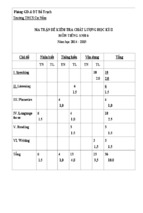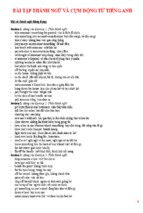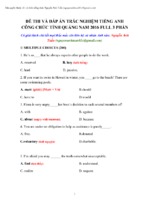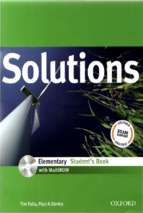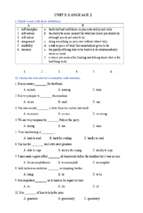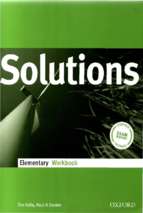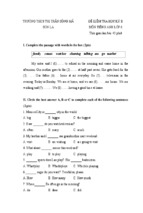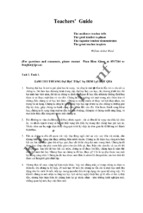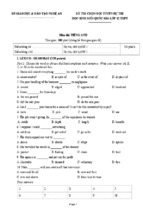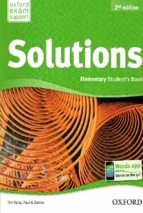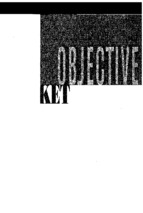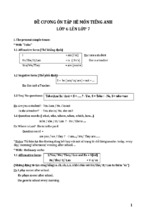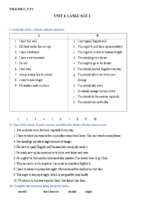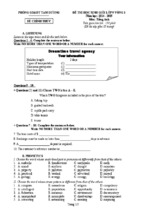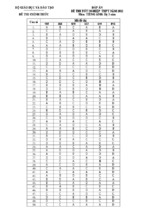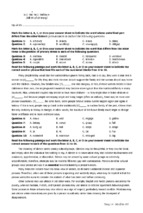Bài tập Unit 9 Cities of the future Tiếng Anh 11 mới cực hay (có đáp án) Bao gồm bài tập Unit 9 Cities of the future của sách Tiếng Anh 11 mới (có đáp án). Bài tập gồm tất cả các dạng từ dễ đến khó, có cả trắc nghiệm và viết lại câu, bao gồm cả bài đọc và bài viết Grammar: question tags, conditional sentences type 0 Writing: write an email to a friend about city life in the future
UNIT 9: LANGUAGE 2
I. Circle the word whose underlined part is pronounced differently from that of the rest
1. A. upgraded
B. consumption
C. urban
D. unbelievable
2. A. dweller
B. detect
C. technology
D. eco-friendly
3. A. presentation
B. sensor
C. infrastructure
D. insoluble
4. A. current
B. sustainable
C. infrastructure
D. rubbish
5. A. climate
B. livable
C. city
D. discussion
II. Circle the word that has different stress position.
6.
7.
8.
9.
A. pessimistic
A. residential
A. infrastructure
A. generate
B. optimistic
B. environment
B. sustainable
B. understand
C. overcrowded
C. insoluble
C. inhabitant
C. innovate
D. innovative
D. enjoyable
D. renewable
D. maximize
III. Circle A, B, C, or D to indicate the correct answer to each of the following questions.
10. New York has invested in improving the ___________ of its water ways in recent years.
A. quality
B. quantity
C. level
D. feature
11. Vancouver is often considered to be one of the most ___________ cities in the world.
A. fit
B. liveable
C. endurable
D. suitable
12. Telecommunications and cloud computing will ___________ transportation foe moving
ideas and intellectual property.
A. change
B. replace
C. remove
D. eliminate
13. Helsinki is a model for the future of ___________ smart growth.
A. city
B. rural
C. urban
D. town
14. A nation with a strong ___________ would be successful in creating numerous smart cities.
A. transport
B. transportation
C. service
D. infrastructure
15. They must figure out how a city can develop to meet the demands of future residents in a
___________ and cost- effective way.
A. continual
B. available
C. sustainable
D. natural
16. . - Kate: “I’d like the blue jacket, please. Can I try it on?
- Cindy: “Yes,
___________”
A. you would
B. Here you are, thank you C. Certainly D. you do
17. Tom : What a beautiful day!
Rose : ___________
A. Yes, it is
B. It’s very hot
C. No, it isn’t
D. Yes. It’s sunny, isn’t
it?
18. It’s very hot! let’s go swimming, ___________?
A. shall we
B. should we
C. do we
D. don’t we
19. I think you’ve seen this picture before, ___________?
A. don’t you
B. do you
C. have you
D. haven’t you
20. If you freeze water, it ___________ into ice.
A. turns
B. is turning
C. will turn
D. would turn
21. Plants___________ if they ___________ enough water.
A. die/ get
B. will die/ don’t get
C. die/ don’t get
D. would die/
didn’t get
22. Neither of them will be treated preferentially, ________ ?
A. won’t they
B. will they
C. won’t them
D. will the
23. Sandy ___________ dinner 4 times this week
A. has cooked
B. have been cooking
C. has been cooking D. cooked
24. Why are your hands so dirty? – I ___________ my bike. I have yet to finish it.
A. repaired
B. have been repaired
C. has been repaired D. have been
repairing
UNIT 9: LANGUAGE 2 – KEYS
I. Circle the word whose underlined part is pronounced differently from that of the rest
1. A. upgraded
B. consumption
C. urban
D. unbelievable
2. A. dweller
B. detect
C. technology
D. eco-friendly
3. A. presentation
B. sensor
C. infrastructure
D. insoluble
4. A. current
B. sustainable
C. infrastructure
D. rubbish
5. A. climate
B. livable
C. city
D. discussion
II. Circle the word that has different stress position
6.
7.
8.
9.
A. pessimistic
A. residential
A. infrastructure
A. generate
B. optimistic
B. environment
B. sustainable
B. understand
C. overcrowded
C. insoluble
C. inhabitant
C. innovate
D. innovative
D. enjoyable
D. renewable
D. maximize
III. Circle A, B, C, or D to indicate the correct answer to each of the following questions.
10. New York has invested in improving the ___________ of its water ways in recent years.
A. quality
B. quantity
C. level
D. feature
11. Vancouver is often considered to be one of the most ___________ cities in the world.
A. fit
B. liveable
C. endurable
D. suitable
12. Telecommunications and cloud computing will ___________ transportation foe moving ideas
and intellectual property.
A. change
B. replace
C. remove
D. eliminate
13. Helsinki is a model for the future of ___________ smart growth.
A. city
B. rural
C. urban
D. town
14. A nation with a strong ___________ would be successful in creating numerous smart cities.
A. transport
B. transportation
C. service
D. infrastructure
15. They must figure out how a city can develop to meet the demands of future residents in a
___________ and cost- effective way.
A. continual
B. available
C. sustainable
D. natural
16. . - Kate: “I’d like the blue jacket, please. Can I try it on?
- Cindy: “Yes, ___________”
A. you would
B. Here you are, thank you C. Certainly D. you do
17. Tom : What a beautiful day!
Rose : ___________
A. Yes, it is
B. It’s very hot
C. No, it isn’t
D. Yes. It’s sunny, isn’t
it?
18. It’s very hot! let’s go swimming, ___________?
A. shall we
B. should we
C. do we
D. don’t we
19. I think you’ve seen this picture before, ___________?
A. don’t you
B. do you
C. have you
D. haven’t you
20. If you freeze water, it ___________ into ice.
A. turns
B. is turning
C. will turn
D. would turn
21. Plants___________ if they ___________ enough water.
A. die/ get
B. will die/ don’t get
C. die/ don’t get
D. would die/
didn’t get
22. Neither of them will be treated preferentially, ________ ?
A. won’t they
B. will they
C. won’t them
D. will
the
23. Sandy ___________ dinner 4 times this week
A. has cooked B. have been cooking
C. has been cooking D. cooked
24. Why are your hands so dirty? – I ___________ my bike. I have yet to finish it.
A. repaired
B. have been repaired
C. has been repaired D. have been repairing
UNIT 9: READING 2
I. Read the text below and decide which answer (A, B, C, or D) best fits each space
Silicon Valley is (1)_______ to hundreds of technology companies, so it comes as no surprise
that San Jose has partnered with tech giant Intel to transform itself (2)_______ a smart city. San Jose
and Intel will work (3)_______ to further the city's Green Vision initiative — a 15-year plan for
economic growth, environmental sustainability, and improved (4)_______ — which it launched in
2007.
Intel expects to help San Jose create 25,000 clean-tech jobs, drive economic growth, and improve the
city's environmental (5)_______. To achieve this (6)_______, Intel will work with the city to track
real-time data on air quality, noise pollution, traffic flow, and other environmental and (7)_______
concerns — which it will then use to encourage(8)_______ to reduce emissions by carpooling or
using public transportation or bicycles to get to work or school.
Smart cities may sound like something of the distant future, (9)_______ many people thought the
same thing about smart phones and smart homes. Jump to 2015 and 64 percent of American adults and
1.9 billion smart home devices have been installed. If smart cities are (10)_______ like these other
smart innovations, we should see them appear in our communities sooner rather than later.
1. A. home
B. house
C. shelter
D. housing
2. A. from
B. to
C. into
D. toward
3. A. each other
B. together
C. one another
D. themselves
4. A. love life
B. a good life
C. the life of quality
D. quality of life
5. A. sustain
B. sustainable
C. sustainably
D. sustainability
6. A. score
B. goal
C. point
D. target
7. A. town
B. rural
C. urban
D. countryside
8. A. inhabitants
B. residents
C. cavemen
D. officials
9. A. because
B. when
C. but
D. as
10. A. anything
B. nothing
C. one
D. most
II. Read the passage and answer the following questions
I find it absolutely fascinating thinking about the future, as technology is rapidly advancing
and in 40 years time, who knows what we’ll be able to do with it. Scientists have recently predicted
that by 2050 the population of the world will be over ten billion and technology will have advanced
so greatly that we will have far more information about all known diseases (and possibly cures), we
will all be living in eco houses and will no longer face sky high electricity bills and we may even be
able to take a holiday to Mars.
Our daily lives will most definitely be littered with all kinds of new technologies that help us
do the things we hate the most in 2017! House Robo’s will be a likely feature in all homes and will
help run the family home, take out the rubbish, prepare food and hoover the house from top to bottom.
Our kitchen gadgets (such as your fridge, cooker, microwave and dishwasher) will also be ‘robotic’
and will email or text us, users, when a food item has gone out of date or has been used up. Similarly,
the fridge has a built in camera so that when you are at the supermarket, you can log in to your fridge
and check what you need to stock up on.
It is predicted that by 2050, we will all have ‘weekly digital health checks’ in our homes,
which run sensors over our bodies to check for signs of ill health and any abnormalities. Conditions
can instantly be recognized by the ‘virtual doctor’ inside the health machine and treated immediately,
and if you need a prescription – it will be ordered and sent out automatically. If the digital health
check picks up on a person being overweight, they will send a signal to the domestic house computer
to modify their diet and book in for gym sessions. Because of all this immediate treatment, people
will live far longer and won’t be wiped out by disease or forms of cancer. Medical conditions that are
considered rare today, will be far more known about and will be able to be cured quickly and
efficiently.
1. What will the world’s population be by 2015?
___________________________________________________________________________
2. How will our kitchen gadgets help us?
___________________________________________________________________________
3. What can you do with the fridge with a built-in camera?
___________________________________________________________________________
4. How can our bodies be checked for signs of ill health and any abnormalities?
___________________________________________________________________________
5. What are the benefits of the immediate treatment?
___________________________________________________________________________
UNIT 9: READING 2 – KEYS
I. Read the text below and decide which answer (A, B, C, or D) best fits each space
Silicon Valley is (1)_______ to hundreds of technology companies, so it comes as no surprise
that San Jose has partnered with tech giant Intel to transform itself (2)_______ a smart city. San Jose
and Intel will work (3)_______ to further the city's Green Vision initiative — a 15-year plan for
economic growth, environmental sustainability, and improved (4)_______ — which it launched in
2007.
Intel expects to help San Jose create 25,000 clean-tech jobs, drive economic growth, and improve the
city's environmental (5)_______. To achieve this (6)_______, Intel will work with the city to track
real-time data on air quality, noise pollution, traffic flow, and other environmental and (7)_______
concerns — which it will then use to encourage(8)_______ to reduce emissions by carpooling or
using public transportation or bicycles to get to work or school.
Smart cities may sound like something of the distant future, (9)_______ many people thought the
same thing about smart phones and smart homes. Jump to 2015 and 64 percent of American adults and
1.9 billion smart home devices have been installed. If smart cities are (10)_______ like these other
smart innovations, we should see them appear in our communities sooner rather than later.
1. A. home
B. house
C. shelter
D. housing
2. A. from
B. to
C. into
D. toward
3. A. each other
B. together
C. one another
D. themselves
4. A. love life
B. a good life
C. the life of quality
D. quality of life
5. A. sustain
B. sustainable
C. sustainably
D. sustainability
6. A. score
B. goal
C. point
D. target
7. A. town
B. rural
C. urban
D. countryside
8. A. inhabitants
B. residents
C. cavemen
D. officials
9. A. because
B. when
C. but
D. as
10. A. anything
B. nothing
C. one
D. most
II. Read the passage and answer the following questions
I find it absolutely fascinating thinking about the future, as technology is rapidly advancing
and in 40 years time, who knows what we’ll be able to do with it. Scientists have recently predicted
that by 2050 the population of the world will be over ten billion and technology will have advanced
so greatly that we will have far more information about all known diseases (and possibly cures), we
will all be living in eco houses and will no longer face sky high electricity bills and we may even be
able to take a holiday to Mars.
Our daily lives will most definitely be littered with all kinds of new technologies that help us
do the things we hate the most in 2017! House Robo’s will be a likely feature in all homes and will
help run the family home, take out the rubbish, prepare food and hoover the house from top to bottom.
Our kitchen gadgets (such as your fridge, cooker, microwave and dishwasher) will also be ‘robotic’
and will email or text us, users, when a food item has gone out of date or has been used up. Similarly,
the fridge has a built in camera so that when you are at the supermarket, you can log in to your fridge
and check what you need to stock up on.
It is predicted that by 2050, we will all have ‘weekly digital health checks’ in our homes,
which run sensors over our bodies to check for signs of ill health and any abnormalities. Conditions
can instantly be recognized by the ‘virtual doctor’ inside the health machine and treated immediately,
and if you need a prescription – it will be ordered and sent out automatically. If the digital health
check picks up on a person being overweight, they will send a signal to the domestic house computer
to modify their diet and book in for gym sessions. Because of all this immediate treatment, people
will live far longer and won’t be wiped out by disease or forms of cancer. Medical conditions that are
considered rare today, will be far more known about and will be able to be cured quickly and
efficiently.
1. What will the world’s population be by 2015?
By 2050 the population of the world will be over ten billion.
2. How will our kitchen gadgets help us?
Our kitchen gadgets (such as your fridge, cooker, microwave and dishwasher) will also be
‘robotic’ and will email or text us, users, when a food item has gone out of date or has been
used up.
3. What can you do with the fridge with a built-in camera?
The fridge has a built in camera so that when you are at the supermarket, you can log in to
your fridge and check what you need to stock up on.
4. How can our bodies be checked for signs of ill health and any abnormalities?
It is predicted that by 2050, we will all have ‘weekly digital health checks’ in our homes,
which run sensors over our bodies to check for signs of ill health and any abnormalities.
Conditions can instantly be recognized by the ‘virtual doctor’ inside the health machine and
treated immediately, and if you need a prescription – it will be ordered and sent out
automatically. If the digital health check picks up on a person being overweight, they will
send a signal to the domestic house computer to modify their diet and book in for gym
sessions.
5. What are the benefits of the immediate treatment?
People will live far longer and won’t be wiped out by disease or forms of cancer.
UNIT 9: LOOKING BACK AND PROJECT 2
I. Circle the word whose underlined part is pronounced differently from that of the rest
1. A. current
B. sustainable
C. infrastructure
D. rubbish
2. A. climate
B. livable
C. city
D. discussion
3. A. solar
B. infrastructure
C. designer
D. focus
II. Circle the word that has different stress position.
4. A. pessimistic
B. optimistic
C. overcrowded
D. innovative
5. A. residential
B. environment
C. insoluble
D. enjoyable
III. Circle A, B, C, or D to indicate the correct answer to each of the following questions.
6. By 2015, 7 out of every 10 people on Earth will be a(n) ________________ .
A. shelter
B. urban residence
C. city developer
D. city dweller
7. Since 2007, Boston police have been using Shotspotter, a system that allows them to
__________ the location of shots fired immediately.
A. detect
B. select
C. collect
D. realize
8. ________________ structure in Ha Noi will be changed with the development of satellite area.
A. City
B. Downtown
C. Urban
D. Town
9. The government is investing billions in ________________ to enhance the quality of life for
people in the countryside.
A. streets
B. roads
C. bridges
D. infrastructure
10. China has already been experimenting with ways to make its city more ________________ for
the last two decades.
A. sustainable
B. harmless
C. continued
D. natural
11. Studies reveal that food production will need to increase by 70 % to ________________ the
over 9 billion people on earth.
A. give
B. supply
C. provide
D. feed
12. This is your essay on smart city by 2050, ________________?
A. is this
B. isn’t it
C. is it
D. isn’t it
13. Across the globe, nations are preparing for water scarcity, ________________?
A. are they B. aren’t they
C. will they
D. won’t they
14. I think the cities of tomorrow also need to consider the availability of open space,
________________?
A. do I
B. don’t I
C. do they
D. don’t they
IV. Fill in the gaps with the correct tenses of the verbs.
15. If I (have) ____________ a problem, my mum always (help) ____________ me.
16. If my father (go) ____________ to bed late, he (be) ____________ bad-tempered in the
morning.
17. If my sister (play) ____________ her music too loudly, my mum (shout) ____________at her.
18. If my brother (have) ____________ lots of homework, he (eat) ____________ his dinner in his
room.
19. If my brother (not have) ____________ any homework, he (practice) ____________ the guitar.
20. If my sister (get) ____________ up late, she (not have) ____________ breakfast.
21. If there (be) ____________ football on TV, my father always (watch) ____________ it.
22. If we (be) ____________noisy, our teacher (give) ____________ us lots of homework.
UNIT 9: LOOKING BACK AND PROJECT 2 – KEYS
I. Circle the word whose underlined part is pronounced differently from that of the rest
1. A. current
B. sustainable
C. infrastructure
D. rubbish
2. A. climate
B. livable
C. city
D. discussion
3. A. solar
B. infrastructure
C. designer
D. focus
II. Circle the word that has different stress position.
4. A. pessimistic
B. optimistic
C. overcrowded
D. innovative
5. A. residential
B. environment
C. insoluble
D. enjoyable
III. Circle A, B, C, or D to indicate the correct answer to each of the following questions.
6. By 2015, 7 out of every 10 people on Earth will be a(n) ________________ .
A. shelter
B. urban residence
C. city developer
D. city dweller
7. Since 2007, Boston police have been using Shotspotter, a system that allows them to
__________ the location of shots fired immediately.
A. detect
B. select
C. collect
D. realize
8. ________________ structure in Ha Noi will be changed with the development of satellite area.
A. City
B. Downtown
C. Urban
D. Town
9. The government is investing billions in ________________ to enhance the quality of life for
people in the countryside.
A. streets
B. roads
C. bridges
D. infrastructure
10. China has already been experimenting with ways to make its city more ________________ for
the last two decades.
A. sustainable
B. harmless
C. continued
D. natural
11. Studies reveal that food production will need to increase by 70 % to ________________ the
over 9 billion people on earth.
A. give
B. supply
C. provide
D. feed
12. This is your essay on smart city by 2050, ________________?
A. is this
B. isn’t it
C. is it
D. isn’t it
13. Across the globe, nations are preparing for water scarcity, ________________?
A. are they
B. aren’t they
C. will they
D. won’t they
14. I think the cities of tomorrow also need to consider the availability of open space,
________________?
A. do I
B. don’t I
C. do they
D. don’t they
IV. Fill in the gaps with the correct tenses of the verbs.
15. If I (have) _____have_______ a problem, my mum always (help) ____helps________ me.
16. If my father (go) ____goes________ to bed late, he (be) ____is______ bad-tempered in the
morning.
17. If my sister (play) ____plays________ her music too loudly, my mum (shout)
_____shouts______ at her.
18. If my brother (have) ____has________ lots of homework, he (eat) _____eats_______ his
dinner in his room.
19. If my brother (not have) _____does not have_______ any homework, he (practice)
_______practice_____ the guitar.
20. If my sister (get) ____gets________ up late, she (not have) _____does not have_______
breakfast.
21. If there (be) _____is_______ football on TV, my father always (watch) ____watches________
it.
22. If we (be) ______are______noisy, our teacher (give) ____gives________ us lots of
homework.
- Xem thêm -

